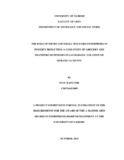| dc.description.abstract | The study focuses on poverty reduction through micro and small enterprises in
Gacharaigu Location of Murang’a County. According to the National Poverty
Eradication Plan 1999
-
2015
many of the disadvantaged groups are in the rural
areas. The Murang’a County Development Profile 2013 showed that the poverty
level was at 36% of the population. This case study examines the role played by
grocery and transport businesses in poverty reduc
tion.
The
study highlights the problem of poverty in Kenya in general, and in Murang’a
County in particular. The objectives of the study were to establish whether the
grocery and transport businesses had a positive impact on house
hold incomes,
whether the
y
enabled the households to meet their basic ne
eds, whether they
contributed towards acquisition of househol
d assets, and whether they
helped to
create employment in the location.
Three theoretical perspectives that are
irrelevant to the area of study ha
ve been used.
These a
re Livelihood
Diversification Theory,
Homans Exchange
Theory and Basic Needs Dimension
on poverty reduction.
Exploratory Research Method was used to generate information and to create
familiarity on poverty
situation and poverty redu
ction in the location.
Purposive
Sampling was used to select 30 respondents from
grocery business and another
30 from the transport business to reach the intended target of 60 respondents Structured questionnaire with grouped frequency distribution was u
sed to collect
quantitative data.
Research findings
were presented in Gr
ouped Frequency Distribution tables,
mostly based
on incomes from businesses and
expenditures
on essential needs for
individual
s
and families
.
It was therefore an
assessment of
the
ability of the
entrepreneurs in both businesses to
meet household
basic needs.
The
conclusion
of the study was that
micro and small enterprises had a role to
play in poverty reduction. The recommendations pointed at the support that the
entrepreneurs nee
ded
in order to boost their businesses,
which would enhance
their ability to provide their families with
essential things of life
,
thereby
improving
the quality of life for their households. | en_US |

